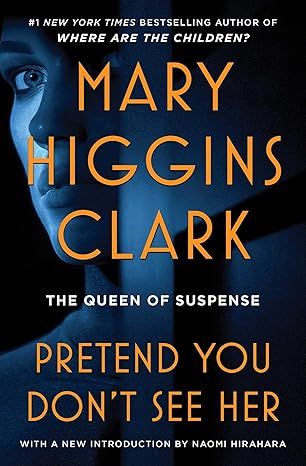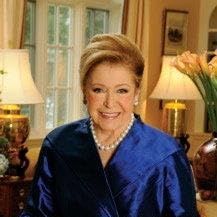Pretend You Don't See HerPaperback
4.5
-
2,987 ratings
Queen of Suspense Mary Higgins Clark brings us another New York Times bestselling novel that she “prepares so carefully and executes with such relish” (The New York Times Book Review) about a witness to a murder who finds that what she’s seen might make her the next casualty.
Mary Higgins Clark sends chills down readers’ spines with the story of Lacey Farrell, a rising star on the Manhattan real estate scene. One day, while showing a luxurious skyline co-op, Lacey is witness to a murder—and to the dying words of the victim. The dying woman is convinced that the attacker was after her dead daughter’s journal—which Lacey gives to the police, but not before making a copy for herself. It’s an impulse that later proves nearly fatal.
Placed in the witness protection program and sent to live in the Minneapolis area, Lacey must assume a fake identity, at least until the killer can be brought to trial. There she meets Tom Lynch, a radio talk-show host whom she tentatively begins to date—until the strain of deception makes her break it off. Then she discovers the killer has traced her to Minneapolis. Armed with nothing more than her own courage and clues from the journal, Lacey heads back to New York, determined to uncover who’s behind the deaths of the two women—before she’s the next casualty.
At once seductive and frightening, Pretend You Don’t See Her is the “mistress of high tension” (The New Yorker) at her ingenious best.
Kindle
$9.99
Available instantly
Audiobook
$0.99
with membership trial
Hardcover
$1.21
Paperback
$11.19
Ships from
Amazon.com
Payment
Secure transaction
ISBN-10
1668026198
ISBN-13
978-1668026199
Print length
336 pages
Language
English
Publisher
Simon & Schuster
Publication date
September 11, 2023
Dimensions
5.5 x 1 x 8.38 inches
Item weight
10.4 ounces
Product details
ASIN :
B000FC0SZU
File size :
1897 KB
Text-to-speech :
Enabled
Screen reader :
Supported
Enhanced typesetting :
Enabled
X-Ray :
Enabled
Word wise :
Enabled
Editorial reviews
Amazon.com Review
Lacey Farrell, the heroine of Mary Higgins Clark's 15th novel, is having a bit of an identity crisis. While working as a real estate agent in New York, Lacey witnessed a client's murder, and now she's in hiding with a new name and a new life. But changing her identity doesn't completely remove Lacey from the web of danger and deceit that surrounds the crime; new clues keep popping up that suggest some kind of link between Lacey's family and the murder. Meanwhile, a new man comes into the heroine's life, further complicating an already murky situation. As any fan will tell you, Mary Higgins Clark never fails to deliver plot twists and turns that are as unexpected as they are thrilling.
From Library Journal
Clark's lucky 13th novel shows that falling in love is hard work when you're in the federal witness protection program.
Copyright 1997 Reed Business Information, Inc.
From Booklist
Lacey Farrell, a Manhattan real-estate agent, gets involved with murder when one of her clients, Isabelle Landi, is killed in front of her. Isabelle has confided in Lacey that she believes the car crash in which her daughter died was no accident. Before Isabelle takes her final breath, she pleads with Lacey to bring pages from her daughter's diary to the girl's father. Lacey does so, but because of what she knows, including her ability to identify the hit man, she lands in the witness-protection program, where she uses her time to find out why Heather and her mother were killed. Lacey is a particularly obtuse heroine, always doing the exact thing that will get her into more trouble, but the story is briskly paced and features a few surprises. Clark's legion of fans will find this pleasing enough, though not top drawer. Ilene Cooper
From Kirkus Reviews
Just in time for Mother's Day, a fresh bouquet of imperiled female virtue from ever-reliable Clark, who ought to take out a patent. Planning to sell her late daughter Heather Landi's East Side apartment, ex-beauty queen Isabelle Waring makes an appointment with realtor Lacey Farrell to check the place out. But when Isabelle finds and reads Heather's journal in the apartment, she refuses to sell to the promising client Lacey's got waiting in the next room. Too late: The client, who's really a hit man looking for the journal, shoots Isabelle, who only has time before she dies to beg Lacey to read the journal and turn it over to Heather's father, gruff restaurateur Jimmy Landi. So Lacey makes a copy of the journal for Jimmy, then reads it herself before taking it to the police. And when she finally does turn the journal over to the authorities, it doesn't do any good; first the original journal and then some crucial pages from Jimmy's copy disappear from police custody. By this time, the police are treating Lacey like some kind of criminal even as the hit man begins stalking her. The US Attorney relocates Lacey to Minneapolis under the Witness Protection Program, but things are no better there: Lacey's lonely, her mother back in New York keeps blurting out hints of Lacey's location to exactly the plausible male intimates veteran Clark-watchers will duly have noted as the most likely threats to Lacey's safety, and the hit man hasn't lost interest either. Innocence unprotected, cops who actually sound like cops, and an implacable enemy with the momentum of a Metroliner. Even if the final revelation of the hit man's employer is weightless, Clark, by concentrating on what she does best--heavy-breathing menace as the hit man's footfalls echo ever louder--has produced her most successful tale since Remember Me (1994)--six books ago. (First printing of 1.1 million; Literary Guild main selection; author tour) -- Copyright ©1997, Kirkus Associates, LP. All rights reserved.
Review
"Pretend You Don't See Her should come with a warning. Start it in the evening and you'll be reading way late into the night....This one is well worth the lost sleep." -- USA Today
From the Publisher
What happens when a young woman, having merely been in the wrong place at the wrong time, is accidentally caught up in a dangerous murder investigation? What happens when she is placed under police protection, forced to give up her identity and move to another part of the country, at least until the killer can be positively identified and apprehended?
What happens when in her new life she meets the perfect man, only she can't risk falling in love because she can't tell anyone -- even him, especially him -- who she really is?
Pretend You Don't See Her is Mary Higgins Clark's brilliant and terrifying new novel, her fifteenth, and her most chilling and suspense-filled yet. Set in New York and in Minneapolis-St. Paul, it is the story of Lacey Farrell, a young rising star on Manhattan's high-powered and competitive real estate scene.
In the course of selling a luxurious skyline coop, Lacey becomes the witness to a murder and hears the dying words of the victim, a woman who is convinced that her attacker was after a journal kept by her daughter up until the day she died in what everyone but her grieving mother believes to have been a tragic accident. Lacey gives the journal to the police, but not before she makes a copy for herself -- an impetuous act that later proves to be almost fatal.
Obliged to give up her family, her job, her very identity, Lacey is placed in the witness protection program and sent to live in the Minneapolis-St. Paul area, where she must assume a new life, at least until the killer can be brought to trial. Once there, she meets and quickly finds herself attracted to Tom Lynch, a young radio talk-show host. He likewise is drawn to her -- but Lacey becomes so upset and confused by the life of lies she is forced to live that she tries to break off their burgeoning relationship. How can she commit to him when she can't even tell him her true name?
Then one day she discovers that the killer has traced her to Minneapolis and will soon place not only her but everyone around her in dire jeopardy. Realizing that she is no longer safe, she decides to go back to New York, determined to confront the threat to her life head on.
Armed with nothing more than her own courage and the ambiguous and mystifying clues found in the journal, Lacey is caught in a fast-paced race against time as she tries to uncover who was behind the deaths of the two women before she, too, is killed -- not realizing that the journal itself is the reason for the murders....
Chilling, spine-tingling suspense is the hallmark of Mary Higgins Clark's novels. In Pretend You Don't See Her, she surpasses herself.
About the Author
The #1 New York Times bestselling author Mary Higgins Clark wrote over forty suspense novels, four collections of short stories, a historical novel, a memoir, and two children’s books. With bestselling author Alafair Burke she wrote the Under Suspicion series including The Cinderella Murder, All Dressed in White, The Sleeping Beauty Killer, Every Breath You Take, You Don’t Own Me, and Piece of My Heart. With her daughter Carol Higgins Clark, she coauthored five suspense novels. More than one hundred million copies of her books are in print in the United States alone. Her books are international bestsellers.
Read more
Sample
Excerpt. © Reprinted by permission. All rights reserved.
Chapter 1
It was the week after Labor Day, and from the steady ringing of the phones in the offices of Parker and Parker, it was clear to Lacey that the summer doldrums finally were over. The Manhattan co-op market had been uncommonly slow this past month; now, finally, things would start to move again.
"It's about time," she told Rick Parker as he delivered a mug of black coffee to her desk. "I haven't had a decent sale since June. Everybody I had on the hook took off for the Hamptons or the Cape, but thank God they're all drifting back into town now. I enjoyed my month off, too, but now it's time to get back to work."
She reached for the coffee. "Thanks. It's nice to have the son and heir wait on me."
"No problem. You look great, Lacey."
Lacey tried to ignore the expression on Rick's face. She always felt as though he were undressing her with his eyes. Spoiled, handsome, and the possessor of a phony charm that he turned on at will, he made her distinctly uncomfortable. Lacey heartily wished his father hadn't moved him from the West Side office. She didn't want her job jeopardized, but lately keeping him at arm's length was becoming a balancing act.
Her phone rang, and she grabbed for it with relief. Saved by the bell, she thought. "Lacey Farrell," she said.
"Miss Farrell, this is Isabelle Waring. I met you when you sold a co-op in my building last spring."
A live one, Lacey thought. Instinctively she guessed that Mrs. Waring was putting her apartment on the market.
Lacey's mind went into its search-and-retrieve mode. She'd sold two apartments in May on East Seventieth, one an estate sale where she hadn't spoken to anyone except the building manager, the second a co-op just off Fifth Avenue. That would be the Norstrum apartment, and she vaguely remembered chatting with an attractive fiftyish redhead in the elevator, who had asked for her business card.
Crossing her fingers, she said, "The Norstrum duplex? We met on the elevator?"
Mrs. Waring sounded pleased. "Exactly! I'm putting my daughter's apartment on the market, and if it's convenient I'd like you to handle it for me."
"It would be very convenient, Mrs. Waring."
Lacey made an appointment with her for the following morning, hung up, and turned to Rick. "What luck! Three East Seventieth. That's a great building," she said.
"Three East Seventieth. What apartment?" he asked quickly.
"Ten B. Do you know that one by any chance?"
"Why would I know it?" he snapped. "Especially since my father, in his wisdom, kept me working the West Side for five years."
It seemed to Lacey that Rick was making a visible effort to be pleasant when he added, "From what little I heard on this end, someone met you, liked you, and wants to dump an exclusive in your lap. I always told you what my grandfather preached about this business, Lacey: You're blessed if people remember YOU."
"Maybe, although I'm not sure it's necessarily a blessing," Lacey said, hoping her slightly negative reaction would end their conversation. She hoped also that Rick would soon come to think of her as just another employee in the family empire.
He shrugged, then made his way to his own office, which overlooked East Sixty-second Street. Lacey's windows faced Madison Avenue. She reveled in the sight of the constant traffic, the hordes of tourists, the well-heeled Madison Avenue types drifting in and out of the designer boutiques.
"Some of us are born New Yorkers," she would explain to the sometimes apprehensive wives of executives being transferred to Manhattan. "Others come here reluctantly, and before they know it, they discover that for all its problems, it's still the best place in the world to live."
Then if questioned, she would explain: "I was raised in Manhattan, and except for being away at college, I've always lived here. It's my home, my town."
Her father, Jack Farrell, had felt that way about the city. From the time she was little, they had explored New York City together. "We're pals, Lace," he would say. "You're like me, a city slicker. Now your mother, God love her, yearns to join the flight to the suburbs. It's to her credit that she sticks it out here, knowing I'd wither on the vine there."
Lacey had inherited not only Jack's love of this city, but his Irish coloring as well - fair skin, blue-green eyes, and dark brown hair. Her sister Kit shared their mother's English heritage - china-blue eyes, and hair the shade of winter wheat.
A musician, Jack Farrell had worked in the theater, usually in the pit orchestra, although sometimes playing in clubs and the occasional concert. Growing up, there wasn't a Broadway musical whose songs Lacey couldn't sing along with her dad. His sudden death just as she had finished college was still a shock. In fact, she wondered if she ever would get over it. Sometimes, when she was in the theater district, she still found herself expecting to run into him.
After the funeral, her mother had said with wry sadness, "Just as your dad predicted, I'm not staying in the city." A pediatric nurse, she bought a condo in New Jersey. She wanted to be near Lacey's sister Kit and her family. Once there, she'd taken a job with a local hospital.
Fresh out of college, Lacey had found a small apartment on East End Avenue and a job at Parker and Parker Realtors. Now, eight years later, she was one of their top agents.
Humming, she pulled out the file on 3 East Seventieth and began to study it. I sold the second-floor duplex, she thought. Nice-sized rooms. High ceilings. Kitchen needed modernizing. Now to find out something about Mrs. Waring's place.
Whenever possible, Lacey liked to do her homework on a prospective listing. To that end, she'd learned that it could help tremendously to become familiar with the people who worked in the various buildings Parker and Parker handled. It was fortunate now that she was good friends with Tim Powers, the superintendent of 3 East Seventieth. She called him, listened for a good twenty minutes to the rundown of his summer, ruefully reminding herself that Tim had always been blessed with the gift of gab, and finally worked the conversation around to the Waring apartment.
According to Tim, Isabelle Waring was the mother of Heather Landi, a young singer and actress who had just begun to make her name in the theater. The daughter as well of famed restaurateur Jimmy Landi, Heather had died early last winter, killed when her car plunged down an embankment as she was driving home from a weekend of skiing in Vermont. The apartment had belonged to Heather, and now, her mother was apparently selling it.
"Mrs. Waring can't believe Heather's death was an accident," Tim said.
When she finally got off the phone, Lacey sat for a long moment, remembering that she had seen Heather Landi last year in a very successful off-Broadway musical. In fact, she remembered her in particular.
She had it all, Lacey thought - beauty, stage presence, and that marvelous soprano voice. A "Ten," as Dad would have said. No wonder her mother is in denial.
Lacey shivered, then rose to turn down the air conditioner.
On Tuesday morning, Isabelle Waring walked through her daughter's apartment, studying it as if with the critical eye of a realtor. She was glad that she had kept Lacey Farrell's business card. Jimmy, her ex-husband, Heather's father, had demanded she put the apartment on the market, and in fairness to him, he had given her plenty of time.
The day she met Lacey Farrell in the elevator, she had taken an instant liking to the young woman, who had reminded her of Heather.
Admittedly, Lacey didn't look like Heather. Heather had had short, curly, light brown hair with golden highlights, and hazel eyes. She had been small, barely five feet four, with a soft, curving body. She called herself the house midget. Lacey, on the other hand, was taller, slimmer, had blue-green eyes, and darker, longer, straighter hair, swinging down to her shoulders, but there was something in her smile and manner that brought back a very positive memory of Heather.
Isabelle looked around her. She realized that not everyone would care for the birch paneling and splashy marble foyer tiles Heather had loved, but those could easily be changed, the renovated kitchen and baths, however, were strong selling points.
After months of brief trips to New York from Cleveland, and making stabs at going through the apartment's five huge closets and the many drawers, and after repeatedly meeting with Heather's friends, Isabelle knew it had to be over. She had to put an end to this searching for reasons and get on with her life.
The fact remained, however, that she just didn't believe Heather's death had been an accident. She knew her daughter; she simply would not have been foolish enough to start driving home from Stowe in a snowstorm, especially so late at night. The medical examiner had been satisfied, however. And Jimmy was satisfied, because Isabelle knew that if he hadn't been, he'd have torn up all of Manhattan looking for answers.
At the last of their infrequent lunches, he had again tried to persuade Isabelle to let it rest, and to get on with her own life. He reasoned that Heather probably couldn't sleep that night, had been worried because there was a heavy snow warning, and knew she had to be back in time for a rehearsal the next day. He simply refused to see anything suspicious or sinister in her death.
Isabelle, though, just couldn't accept it. She had told him about a troubling phone conversation she had had with their daughter just before her death. "Jimmy, Heather wasn't herself when I spoke to her on the phone. She was worried about something. Terribly worried. I could hear it in her voice."
The lunch had ended when Jimmy, in complete exasperation, had burst out, "Isabelle, get off it! Stop, please! This whole thing is tough enough without you going on like this, constantly rehashing everything, putting all her friends through the third degree. Please, let our daughter rest in peace."
Remembering his words, Isabelle shook her head. Jimmy Landi had loved Heather more than anything in the world. And next to her, he loved power, she thought bitterly - it's what had ended their marriage. His famous restaurant, his investments, now his Atlantic City hotel and casino. No room for me ever, Isabelle thought. Maybe if he had taken on a partner years ago, the way he has Steve Abbott now, our marriage wouldn't have failed. She realized she had been walking through rooms she wasn't really seeing, so she stopped at a window overlooking Fifth Avenue.
New York is especially beautiful in September, she mused, observing the joggers on the paths that threaded through Central Park, the nannies pushing strollers, the elderly sunning themselves on park benches. I used to take Heather's baby carriage over to the park on days like this, she remembered. It took ten years and three miscarriages before I had her, but she was worth all the heartbreak. She was such a special baby. People were always stopping to took at her and admire her. And she knew it, of course. She loved to sit up and take everything in. She was so smart, so observant, so talented, so trusting...
Why did you throw it away, Heather? Isabelle asked her self once more the questions that she had agonized over since her daughter's death. After that accident when you were a child - when you saw that car skid off the road and crash - you were always terrified of icy roads. You even talked of moving to California just to avoid winter weather. Why then would you have driven over a snowy mountain at two in the morning? You were only twenty-four years old; you had so much to live for. What happened that night? What made you take that drive? Or who made you?
The buzzing of the intercom jolted Isabelle back from the smothering pangs of hopeless regret. It was the doorman announcing that Miss Farrell was here for her ten o'clock appointment.
Lacey was not prepared for Isabelle Waring's effusive, if nervous, greeting. "Good heavens, you look younger than I remembered," she said. "How old are you? Thirty? My daughter would have been twenty-five next week, you know. She lived in this apartment. It was hers. Her father bought it for her. Terrible reversal, don't you think? The natural order of life is that I'd go first and someday she'd sort through my things."
"I have two nephews and a niece," Lacey told her. "I can't imagine anything happening to any of them, so I think I understand something of what you are going through."
Isabelle followed her, as with a practiced eye Lacey made notes on the dimensions of the rooms. The first floor consisted of a foyer, large living and dining rooms, a small library, a kitchen, and a powder room. The second floor, reached by a winding staircase, had a master suite - a sitting room, dressing room, bedroom and bath.
"It was a lot of space for a young woman," Isabelle explained. "Heather's father bought it for her, you see. He couldn't do enough for her. But it never spoiled her. In fact, when she came to New York to live after college, she wanted to rent a little apartment on the West Side. Jimmy hit the ceiling. He wanted her in a building with a doorman. He wanted her to be safe. Now he wants me to sell the apartment and keep the money. He says Heather would have wanted me to have it. He says I have to stop grieving and go on. It's just that it's still so hard to let it go, though...I'm trying, but I'm not sure I can..." Her eyes filled with tears.
Lacey asked the question she needed to have answered: "Are you sure you want to sell?"
She watched helplessly as the stoic expression on Isabelle Waring's face crumbled and her eyes filled with tears. "I wanted to find out why my daughter died. Why she rushed out of the ski lodge that night. Why she didn't wait and come back with friends the next morning, as she had planned. What changed her mind? I'm sure that somebody knows. I need a reason. I know she was terribly worried about something but wouldn't tell me what it was. I thought I might find an answer here, either in the apartment or from one of her friends. But her father wants me to stop pestering people, and I suppose he's right, that we have to go on, so yes, Lacey, I guess I want to sell."
Lacey covered the woman's hand with her own. "I think Heather would want you to," she said quietly.
That night Lacey made the twenty-five-mile drive to Wyckoff, New Jersey, where her sister Kit and her mother both lived. She hadn't seen them since early August when she had left the city for her month away in the Hamptons. Kit and her husband, Jay, had a summer home on Nantucket, and always urged Lacey to spend her vacation with them instead.
As she crossed the George Washington Bridge, Lacey braced herself for the reproaches she knew would be part of their greeting. "You only spent three days with us," her brother-in-law would be sure to remind her. "What's East Hampton got that Nantucket doesn't?"
For one thing it doesn't have you, Lacey thought, with a slight grin.
Continues...
Read more
About the authors
Mary Higgins Clark
Mary Higgins Clark is the author of twenty-two worldwide bestselling works of fiction and a memoir. She lives in Saddle River, New Jersey, with her husband.
Reviews
Customer reviews
4.5 out of 5
2,987 global ratings
Kindle Customer
5
Excellent
Reviewed in the United States on November 2, 2023
Verified Purchase
Very enjoyable. I enjoyed the characters, as they were realistic, with their faults and interactions. An interesting, involving suspense thriller.
Gracie horton
5
Intriguing, keeps you wanting to read all night
Reviewed in the United States on October 4, 2022
Verified Purchase
I would definitely recommend. You cant wait to turn the page. I love a crime with a little romance in it !
3 people found this helpful
galleygal
5
Fantastic
Reviewed in the United States on October 24, 2023
Verified Purchase
A constant page turner! Very well written and thoughtfully put together So happy to have made this choice. Thank you Ms. Clark
Haven
5
Sensational
Reviewed in the United States on August 14, 2020
Verified Purchase
Mary Higgins Clark is the Queen of Suspense, she definitely proves it in Pretend You Don’t See Her. She had me guessing all through this exciting book. The web that was formed and bits of clues provided the puzzles to solve the mystery were constantly changing. Enjoy another good read from this author.
9 people found this helpful
Samantha Jane
5
Great price for a great book
Reviewed in the United States on July 22, 2023
Verified Purchase
Book arrived when expected and in condition expected. Great price for a great book!
Top Mary Higgins Clark titles
View all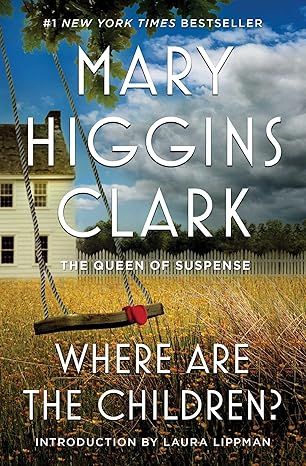
Where Are the Children?
4.5
-
5,335
$0.99
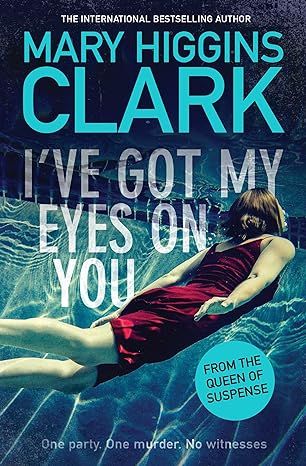
Ive Got My Eyes On You
4.4
-
9,813
$0.99
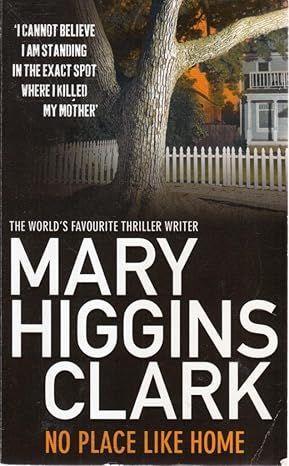
No Place Like Home Pa
4.5
-
2,319
$0.99
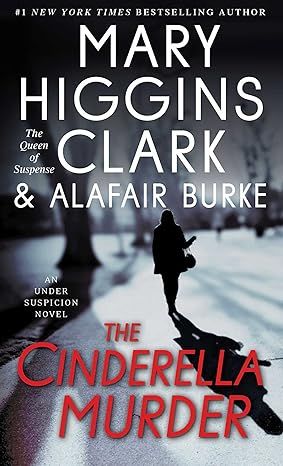
Cinderella Murder
4.4
-
11,507
$0.99
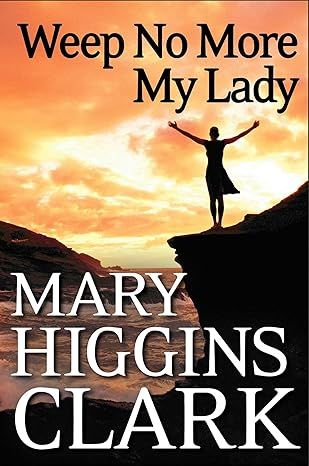
Weep No More, My Lady
4.4
-
1,899
$8.98
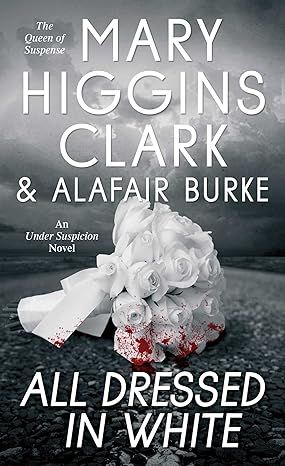
All Dressed in White
4.5
-
9,844
$0.99
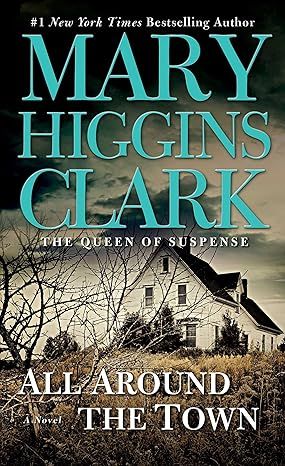
All Around The Town
4.5
-
3,479
$1.35
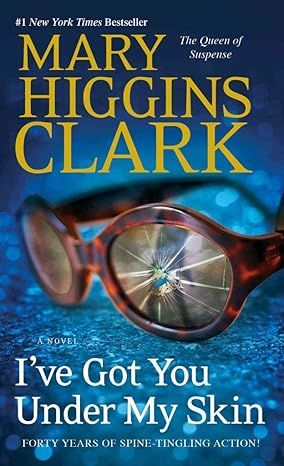
I've Got You Under My Skin: A Novel (Under Suspicion Book 1)
4.4
-
12,850
$0.99
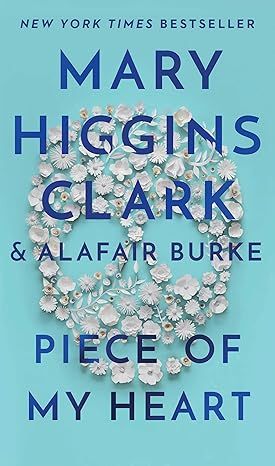
Piece of My Heart
4.6
-
9,525
$0.99
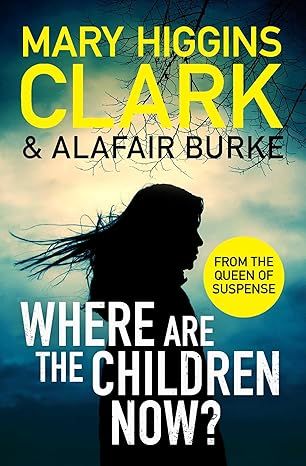
Where Are The Children Now?: Return to where it all began with the bestselling Queen of Suspense
4.6
-
3,482
$0.99
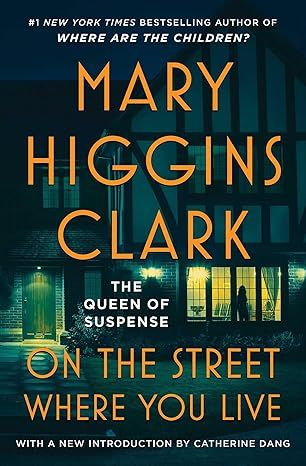
On the Street Where You Live
4.4
-
2,444
$0.99
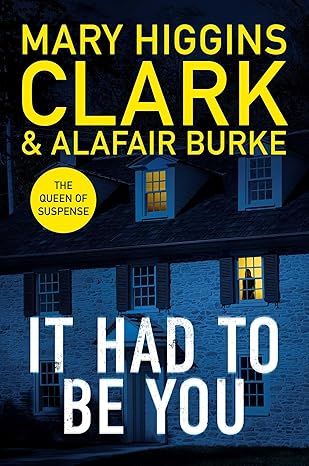
It Had To Be You: The thrilling new novel from the bestselling Queens of Suspense
4.6
-
2,435
$0.99
Best Sellers
View all
The Tuscan Child
4.2
-
100,022
$8.39

The Thursday Murder Club: A Novel (A Thursday Murder Club Mystery)
4.3
-
155,575
$6.33

Sapiens: A Brief History of Humankind
4.6
-
140,302
$13.49

The Butterfly Garden (The Collector, 1)
4.3
-
88,556
$9.59

Things We Hide from the Light (Knockemout Series, 2)
4.4
-
94,890
$11.66

The Last Thing He Told Me: A Novel
4.3
-
154,085
$2.99

The Perfect Marriage: A Completely Gripping Psychological Suspense
4.3
-
143,196
$9.47

The Coworker
4.1
-
80,003
$13.48

First Lie Wins: A Novel (Random House Large Print)
4.3
-
54,062
$14.99

Mile High (Windy City Series Book 1)
4.4
-
59,745
$16.19

Layla
4.2
-
107,613
$8.99

The Locked Door
4.4
-
94,673
$8.53
